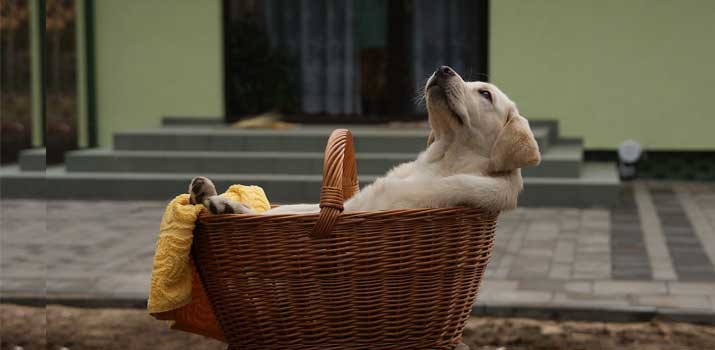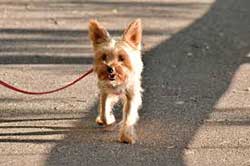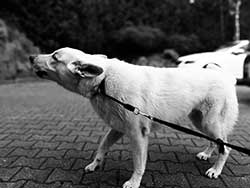Puppies are big balls of energy! Whether they’re following your every move around the house or they’re off in the corner getting into some trouble, your pup’s high energy levels are quite endearing.
It’s one of the most enjoyable parts of raising a puppy! They’re always down to clown!

That said, there’s going to be some times when you just wish your pup would calm down.
No matter how much you love your dog’s penchant for play, we can only take so much! Not only that, but all that energy often leads to some trouble.
Puppies are notorious for using that pent-up energy to destroy things and test their boundaries.
Those high energy levels are to be expected. But at what age do puppies start to calm down?
All About Puppy Energy
High energy levels are to be expected with puppies. After all, they’re experiencing a world of new things. Think about how you behaved when you were a young child.
Everything is exciting and fun! Puppies are the same way.
Whenever they’re not sleeping, puppies are running around and looking for things to explore.
Truth is, puppies don’t mature and calm down at a set age. All dogs are different. Some puppies even come out of the womb with a seemingly mellow attitude!
There are several factors that will affect your pup’s energy levels. It’s not just age.
When you’re trying to figure out a timeline of when your dog will calm down, there are a few things to consider.
Breed
Believe it or not, your dog’s breed has a big effect on their energy levels and maturity.
Pay attention the next time you visit a dog park. You’ll quickly notice that some breeds are naturally more energetic than others.
Typically, dogs that were originally bred to work have high energy levels right off the bat. The same goes for breeds that are commonly used for sporting events.
This includes Border Collies, Dachshunds, Terriers, and Greyhounds.
Those dogs will hold onto their high energy levels for much longer.
Even into adulthood, they will continue to be vivacious and full of life. However, it’s usually a bit more controlled than when they’re puppies.
The size of your dog plays a role, too. Smaller dogs mature much faster.
They tend to reach full maturity sooner than larger dogs. Thus, they mellow out and get past the adolescent stage quicker.
Psychological State
During your dog’s puppy years, it’s important to expose them to as many new things as possible.
Doing so will decrease your chances of experiencing aggression or anxiety in the future.

So, what if a puppy is holed up in a single home for most of their adolescent life? Chances are, that puppy is going to take longer to calm down. That’s because psychologically, they are younger.
For example, keeping your puppy sheltered during those crucial months of exposure is like putting a pause on their mental development.
When you finally take them out and expose them to the world, they’re suddenly experiencing those new things like a younger pup would.
Social Structure
If you have multiple dogs, maturity tends to happen pretty quickly. This is especially true if you have older dogs.
Puppies will join the pack and automatically be placed at the bottom of the totem pole!
While we may not understand the social structures of canines, you can often witness older dogs putting younger ones in their place. Older dogs are used to their calmer routine.
They have no time for the rambunctiousness of a young pup!
Thus, older dogs will help younger pups learn the ropes and mature.
Sex
Females are known to mature pretty quickly. Most are ready to have babies by the time they are six to nine months old!
With that biological maturity comes a calmer attitude.
Males, on the other hand, take a bit longer. There’s also spaying and neutering to consider. We’ll get into that more later.
How Puppy Energy Levels Change
All dogs are different in terms of how they mature. However, all dogs will follow a similar growth pattern.
As they do through the puppy stages, you may notice an evolution in their energy levels. Here’s what you can expect.
— From a Newborn to 10 Weeks of Age
After a puppy is born, you’ll experience the most dramatic change in behavior.
When they first come out of the womb, puppies are helpless creatures that rely on their mothers for everything. They can’t even see!
Your puppy’s eyes won’t open until about the two-week mark.
Even after their eyes open up, puppies are still going to be relatively shy and reserved. They will need to rely on their mother’s milk for sustenance. Thus, they tend to stay pretty close by.
As they start to move a little farther from the nest, the mother will usually bring them right back until she feels that they are ready.
When that time comes, be prepared for a big bundle of energy!
Once puppies are able to walk and run on their own, they will take full advantage of it! They will start to learn social cues and play with others in the litter.
If they’re alone, you might see them biting at your fingers to play fight! It’s an adorable stage, so cherish it!
— 10 Weeks Old to 16 Weeks Old
At this point, training should be a regular part of your puppy’s day. Chances are, your puppy is still as energetic as ever! Young pups tend to have short attention spans. So, you’ll need to be patient.
Keep those training sessions short. However, remain vigilant and keep up with your methods.
You can consider this age range to be the teenage years. Puppies will start testing their boundaries a bit to see what they can get away with.
For example, they might ignore commands or go into places they aren’t supposed to be in.

Puppies at this age are notorious for getting into trouble. Keep a watchful eye and start cracking down on those bad behaviors.
Another important thing to remember is that most puppies start teething at this age. Their first set of baby teeth will fall out. This makes their mouth very itchy and uncomfortable.
To get relief, puppies will chew on anything they can get their jaws around. Make sure you have some chew toys on hand to avoid damage to your furniture.
— Four Months Old to Six Months Old
After four months, your dog should have completed their vaccination schedule. So, take this opportunity to provide even more exposure to new things.
Hopefully, they’ve already seen a ton of people and environments.
Now that your pup is all vaccinated, you can take things a step further.
Energy levels are still going to be high at this age. However, your pup will be focusing a lot of that energy towards other dogs. It’s when they figure out the social structure.
You might see play fighting, barking, and seemingly aggressive behavior. Don’t worry! This is normal.

What you do need to worry about is fearfulness, overt aggression, and overall anxiety. These are issues that you should address as quickly as possible.
If your dog loses his temper quickly and lashes out at you or other dogs, take action.
The same goes for unnecessary anxiety when you’re not at home or whenever they experience new things.
If necessary, get some help from a professional trainer. The goal is to divert your dog’s energy to more positive emotions.
Puppies can get riled up pretty easily at this age. The last thing you want is that energy going to unwanted behaviors.
— Six Months of Age to One Year Old
By this point, your puppy is more familiar with their routine. They understand how things work. However, your training is not over.
Pups will still be relatively energetic. Thus, you need to make sure that training, socialization, and structured exercise is still there.
This is when you’re going to start to see dogs calm down a bit. It’s not going to be a major change or sudden switch. But, that comfort will cause your dog to mellow out a bit.
— One to Two Years of Age
Depending on your dog’s breed, they will reach full adulthood after a year or two of life.
Larger breeds tend to mature slower, so it may happen closer to the two-year mark.
Either way, this is when your dog will be much calmer. That doesn’t mean that they won’t have energy. But, it will be controlled energy reserved for outside playtime.
When you look back at the previous stage, you’ll notice a significant difference in behavior. Give yourself a pat on the back! You successfully raised your pup!
How You Can Calm Your Dog Down
A big part of helping your dog mature is proper training. Just because puppies are naturally more energetic than older dogs doesn’t mean that you can just let that energy go unchecked.
Here are some ways that you can promote calmness in your puppy. Use these techniques regularly and you’ll raise your pup to be a calm and well-rounded dog.
Regular Exercise
The best way to calm your pooch down is to let them exercise! Pent-up energy is your worst enemy during the puppy phase. A bored puppy is a destructive puppy!
With regular exercise, you’re giving your furry friend a chance to use up that energy. Go on long walks and play some intense rounds of fetch.
Not only will it tucker your puppy out, but it’ll strengthen that bond you have.
Mental Stimulation
It’s not just physical exercise you have to worry about.
If your puppy is cooped up in their crate or room all day while you work, you need to provide ways to keep their mind occupied.
Consider investing in some mental stimulation toys. You can try slow puzzle feeders, treat-dispensing toys, or simple interactive games.
Whatever the case may be, these toys will keep your dog’s mind busy for hours on end.
Established Routines
Create an established routine and stick to it! Dogs are fully capable of knowing when it’s time to go outside even if they can’t read a clock.
When you have a routine in place, your dog will know that those fun times are coming.
If you just randomly take your pup out whenever they want, it leaves a sense of uncertainty for your pup. So, they’re going to try and have fun as much as possible because they don’t know when that next play session will come!
The same goes for feeding times. Be strategic about when you feed your dog. The biggest mistake you can make is feeding your dog just before bedtime.
That kibble is going to energize your puppy even more! They’ll stay awake longer.
Crate Training
Crate training is one of the best training techniques out there. While many owners view it as a form of punishment, it doesn’t have to be.
Your dog’s crate is going to become a haven. It’s where they are going to sleep and relax.
As your pup gets comfortable with the crate space, they will start associating it with calmness and security. Use this to your advantage!
Whenever your dog’s energy is starting to cause problems, put them in the crate. It’ll naturally calm them down. In most cases, they’ll just go right to sleep.
Obedience Training
Most owners focus so much on crate training or house training that they forget about obedience training. Your dog must know when to listen to your commands.
Proper obedience training can keep your dog safe while also making it easier to calm things down.
There are many techniques that you can try out. Everything from sitting down to learning how to shake is good.
As long as your techniques involve your puppy giving you their undivided attention, it can be used to calm them down.
That said, the best commands are going to ones that force your dog to sit and listen. So, attention-based commands, recall commands, and sitting commands should be your top priority.
Ignoring Your Dog
Last, but not least, you can just ignore your puppy! While this might seem a bit cruel, it’s an incredibly effective calming technique. At the end of the day, puppies just want to have your attention.
When you don’t give it to them, they’ll calm down and move on.
You mustn’t teach your dog to get overly excited at every minor occasion. For example, many owners make a big deal about leaving for work or coming back home.
While you might be excited to see your precious pup, don’t show it. Ignore them until they calm down! When you shower attention onto them, they’ll learn to miss you when you’re not around.
As cute as that sounds, it can be detrimental to their training.
They could turn to destructive behavior or spend your entire workday barking for you. That’s not exactly something you want.
The best-case scenario is having a dog that knows how to remain calm and relaxed when you’re away.
Conclusion
Most dogs are going to start calming down at around six to nine months of age. By the time they’ve reached full maturity, which is between one and two years of age, all that excessive puppy energy should be a thing of the past!
Of course, every dog is different. It’s important to watch your puppy’s behavior and stick to your training techniques.
Give some of our calming tips a try. It’ll make a world of difference for those overly-excited puppies!
Also Read: Dog Keeps Barking When Walking Outside

